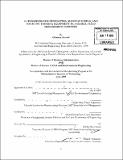A framework for developing, manufacturing, and sourcing trucks & equipment in a global fluid management industry
Author(s)
Awwad, Ghassan Samir
DownloadFull printable version (18.77Mb)
Other Contributors
Leaders for Manufacturing Program.
Advisor
Charles Fine and David Simchi-Levi.
Terms of use
Metadata
Show full item recordAbstract
Selecting and executing the optimal strategy for developing new products is a non trivial task, especially for low volume, high complexity products in a highly volatile global industry such as Fluid Management. At Fluid Management Corporation (FMC), Trucks and Equipment (T&E) that are used to deliver services both onshore and offshore currently follow a single product development model: In-house design; Outsourced prototyping, testing, and manufacturing. The objective of this research work is to challenge the status quo and to provide FMC with a practical framework that helps to determine the optimal development strategy. Rather than following a single development strategy for the entire portfolio of trucks and equipment products, the new methodology recommends a development strategy at a product functionality level and product feature level. Product development strategy is defined here using three dimensions: Design strategy; Manufacturing strategy; and Supply Chain strategy. Each functionality or feature is evaluated using a set of six criteria which then maps that functionality or feature to a specific recommended location on a three dimensional strategy cube. The set of evaluation criteria were derived from exploring and analyzing the current product development process, and from benchmarking world class companies from a wide range of different industries. The results show that for functionalities and features that differentiate FMC from its competitors and are viewed as core competencies, FMC should consider in sourcing the design, prototyping, and testing processes. (cont.) These functionalities include blending, pumping, software development, and system integration. Similarly, for functionalities and features that are not viewed as core competencies such as transport units, storage, and power generation, FMC should consider outsourcing the development process including design.
Description
Thesis (M.B.A.)--Massachusetts Institute of Technology, Sloan School of Management; and, (S.M.)--Massachusetts Institute of Technology, Dept. of Civil and Environmental Engineering; in conjunction with the Leaders for Manufacturing Program at MIT, 2009. Includes bibliographical references (p. 48).
Date issued
2009Department
Leaders for Manufacturing Program at MIT; Massachusetts Institute of Technology. Department of Civil and Environmental Engineering; Sloan School of ManagementPublisher
Massachusetts Institute of Technology
Keywords
Sloan School of Management., Civil and Environmental Engineering., Leaders for Manufacturing Program.